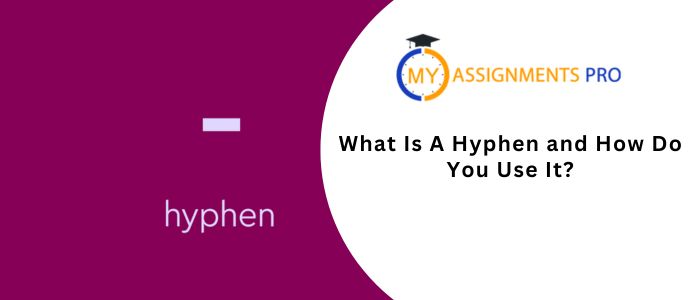
When it comes to improving literary clarity and precision, the hyphen is an essential tool in the huge realm of punctuation. Knowing when and how to use hyphens will greatly enhance your written communication, whether you're a professional writing a report or a student writing an academic paper. Through an in-depth examination of hyphen usage, this guide by Global Assignment Help will provide you with the skills and assurance necessary to utilize them successfully. Learn more about hyphens in this article, including their many uses and how writing may be improved by being proficient with this basic punctuation mark.
Understanding Hyphens with My Assignment Services: Definition and Purpose!
Hyphens are among the most essential punctuation signs that can make your text more readable and understandable. They serve to link clauses together or create a unity between separate thoughts or ideas by connecting either portions within sentences or entire words themselves. As per global assignment help, they are employed in various situations, such as the formation of compound words and the indication of split words at line ends.
Hyphens join separate words to create complex words or improve clarity in language, used usually. For a mum-in-law or well-being, hyphens link separately these words to add them in one meaningful unit while making up complex examples. Prefixes and suffixes also have hyphens that prevent misconstruction for example re-enter or anti-inflammatory of contrasts in compounds formed through affixation. Hyphens are used for keeping format and readability intact because they separate the words placed at the end of lines of text.
When you understand the meaning and use of hyphens it can help you use them better in writing, thus making it more precise and polished. Your work might be clearer and more engaging to the reader by eliminating uncertainty and proper hyphenation.
Common Uses of Hyphens: Learn From Australian Assignment Help!
Hyphens can be used to improve the accuracy and clarity of writing in different circumstances. They are commonly used for splitting words at the end of lines, forming compound words or connecting prefixes and suffixes to root words. We examine these applications in-depth here.
Forming Compound Words
The creation of compound words is one of the most common uses for hyphens. These are compound words, consisting of two or more simpler words that work together to express a certain idea. Three primary categories of compound words exist:
Open Compounds
Examples of this include "post office" and "high school," which are written as distinct words but are seen as one single entity. Additionally, to get a deeper understanding of open compounds, you can consult our experts at my assignment services.
Closed Compounds
Closed compounds, like "notebook" and "basketball," are written as a single word.
Hyphenated Compounds
Hyphenated Compounds join words with hyphens, as in "mother-in-law" and "well-being."
When a hyphen appears in a word combination to remove any ambiguity or confusion, the composite words are invaluable. For instance, “small-business owner” gives the impression that the person owns a small company whereas “small-business owner” refers to someone who owns a small business.
Connecting Prefixes and Suffixes
As per Australian assignment help, hyphens are also necessary when prefixing and suffixing words to their root, particularly to avoid strange letter combinations or misunderstandings. As an illustration:
Prefixes
Employ hyphens when combining prefixes such as "all-" (all-encompassing), "self-" (self-esteem), and "ex-" (ex-president).
Suffixes
Hyphens can occur with suffixes in words like "run-in" and "passer-by," however they are less common.
A hyphen can help to make a word's meaning more clear when it is prefixed. "Resign" means to quit, but "re-sign" means to sign again.
Breaking Words at Line Ends
To maintain correct text formatting and readability, hyphens are also employed to separate words at the end of lines. In word processing and typesetting, this technique is very popular for avoiding ugly gaps and uneven text alignment. Nonetheless, to preserve readability and avoid misunderstanding, proper word-breaking is essential. My assignment services are always eager to assist students online through guided and live sessions.
To sum up, hyphens are tiny but effective writing tools that support the formation of compound words, the joining of prefixes and suffixes, and the control of line breaks. The clarity and polish of your writing may be substantially improved by comprehending and appropriately applying hyphens.
Practical Tips for Using Hyphens by Australian Assignment Help!
Proper use of hyphens may greatly enhance your writing's readability and clarity. The following useful advice can help you use hyphens in your text:
Forming Compound Adjectives
- Hyphens are used to join words that complement one another to describe a noun. Hyphens are used to produce distinct, complex adjectives, as in "well-known author," "high-speed chase," and "full-time job".
- When compound adjectives come after the noun they describe, omit the hyphen. Consider the statement, "The author is well known." If you are struggling to complete your assignment, you can opt for my assignment services anytime.
Avoiding Ambiguity
- To make sentences clearer, enclose them with hyphens. The difference between "recover" and "recover" (to cover again and become well) demonstrates how hyphens may alter a word's meaning.
- Likewise, "coop" (a location where hens are housed) and "co-op," which is short for cooperative, are not the same.
Clarifying Prefixes
- As per Australian assignment help, put hyphens before several prefixes to prevent strange pairings or misunderstandings. To illustrate, consider the terms "re-enter," "anti-inflammatory," and "pre-existing."
- When a prefix precedes a capital letter, such as in "pre-Renaissance" or "mid-June," it is always necessary to hyphenate.
Breaking Words at Line Ends
- Keep the text format clean by using hyphens to separate words at line endings. Avoid breaking words at natural syllable boundaries, such as "investment" not "investment."
- Make sure the broken word can still be read and understood. Steer clear of hyphenating existing short words or words with several hyphens.
Creating Compound Nouns
- For clarification, some compound nouns need to be hyphenated. For instance, "editor-in-chief," "runner-up," and "mother-in-law."
- When a noun compound has two parts, "check-in" (noun) and "check-in" (verb), the meaning might be ambiguous without hyphens. In case you are facing issues comprehending any of these, you can consult our professionals at my assignment services to get instant assistance with your assignment.
Hyphenating Numbers and Fractions
- For compound numbers between twenty-one and ninety-nine (such as "thirty-four" and "seventy-eight"), use hyphens.
- Fractions that are employed as adjectives, such as "a two-thirds majority" or "a one-half portion," can be hyphenated.
Maintaining Consistency
- Use hyphens consistently throughout your document. If you decide to hyphenate a phrase, stick with it throughout to keep things consistent.
- For information on particular guidelines and preferences, consult a trustworthy style manual (such as The Chicago Manual of Style or AP Stylebook).
Handling Suspended Compounds
- Use hyphens to denote the shared portion of a compound adjective when two or more of them have a common basis. For instance, "five- and ten-year plans" or "long- and short-term goals." By opting for Australian assignment help you also get access to thousands of assignment samples and guides created by our professionals.
Referring to Dictionaries
- Since usage varies, consult a dictionary to ensure that terms are hyphenated correctly. Guidelines for hyphenating prefixes and complex words are available from trustworthy dictionaries.
You may become an expert hyphenator by using these useful pointers, which will improve the coherence, accuracy, and polish of your writing. When you hyphenate your text correctly, it becomes simpler to read and more interesting, which enhances the efficacy of your message.
Conclusion: Enhance Your Writing with Hyphens and My Assignments Pro!
Your writing will be much more professional and clear if you know how to utilize hyphens correctly. Hyphens are fundamental writing tools that help with compound word formation and ambiguity avoidance. You may make sure your writing is accurate and impactful by becoming proficient with the hyphenation rules and principles.
Our Australian assignment help can help you if you want to improve your writing or if you need help with any writing-related assignments. You may get complete help to improve your academic and professional writing from our staff of knowledgeable writers and editors, My Assignments Pro is your go-to option for obtaining perfection in writing, regardless of whether you need assistance with hyphenation, grammar, or any other area.



